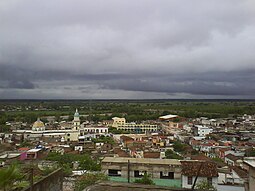Santiago Ixcuintla
This article may be expanded with text translated from the corresponding article in Spanish. (September 2014) Click [show] for important translation instructions.
|
Santiago Ixcuintla | |
|---|---|
 View of Santiago Ixcuintla | |
 Seal | |
 Location of Santiago Ixcuintla in Nayarit | |
| Coordinates: 21°02′N 104°22′W / 21.03°N 104.37°WCoordinates: 21°02′N 104°22′W / 21.03°N 104.37°W | |
| Country | |
| State | |
| Municipality | Santiago Ixcuintla |
| Time zone | UTC−7 (MST (Zona Pacífico)) |
| • Summer (DST) | UTC−6 (MDT (Zona Pacífico)) |
Santiago de Ixcuintla is a municipality and a municipal seat in the western Mexican state of Nayarit. The municipal population was 84,314 inhabitants (census of 2000) with the municipal seat having 18,269. The area of the municipality was 1,831.92 square kilometers. It is located at 21º48'40" N and 105º12'23" W.
The most important population centers are the municipal seat, Santiago Ixcuintla, with 18,169 inhabitants; Villa Hidalgo with 11,175, La Presa with 3,932, Yago with 3,919, Pozo de Ibarra with 3,342 and Villa Juárez with 3,158. Forty-six percent of the population lives in these communities.
Much of the land is only slightly above sea level. Lagoons make up the western section where two important rivers, the Río Grande de Santiago and the , enter the sea. In the east the land gradually rises to form the foothills of the Sierra Madre Occidental. The municipal seat of Santiago is situated at approximately 30 meters above sea level.
The economy is based on agriculture and small manufacturing industries. The main crops are tobacco, citrus fruits, beans, watermelon, chile, mangoes, bananas, and coffee. Santiago is one of the most important tobacco producing regions of the country. Fishing along the coast and in the many lagoons is also important.
On July 11, 1991 a sounding rocket was launched at Santiago Ixcuintla for solar research during a solar eclipse.[1]
There is an unexploited touristic potential in the area due to the vast inland waters making up the Marismas Nacionales.[2] This protected area consists of a vast network of brackish coastal lagoons, mangrove swamps, mudflats, and marshes. It is fed by the Río Acaponeta and tributary streams, including the delta of the Río San Pedro. On one of the lagoons lies the island village of Mexcaltitlán, accessible only by small boat.
References[]
| Wikimedia Commons has media related to Santiago Ixcuintla Municipality. |
- Populated places in Nayarit
- Municipalities of Nayarit

